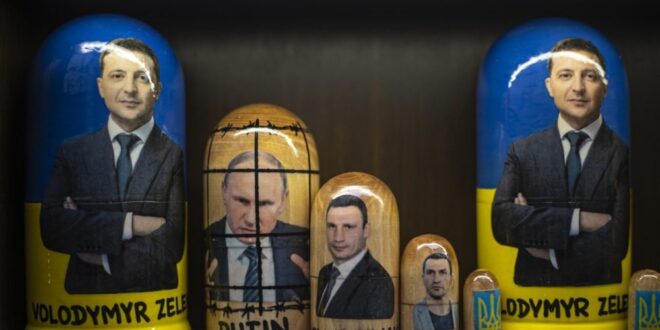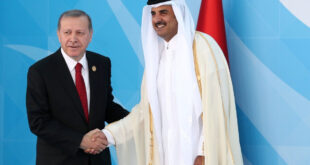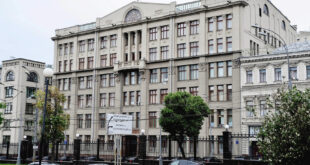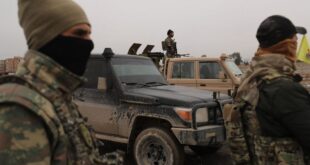Attitudes on the war paint a complex picture where existential security threats are twisted by domestic political dynamics, but a sense of weariness is becoming evident even in the region’s most pro-Ukrainian countries.
Like Poland, Czechia has been one of Ukraine’s staunchest supporters since the earliest days of the war. Yet after more than two years of a conflict that shows little sign of ending, the mood has soured.
One of the latest surveys found that about 65 per cent of Czechs were in favour of an early end to the war even at the expense of territorial losses to Russia. The figure has not significantly changed over the past year, but it speaks volumes in a country where the “Munich betrayal” of 1938 remains one of the darkest stains in the country’s modern history.
The STEM poll also found that a majority of the population opposes negotiations on Ukraine’s accession to the EU (64 per cent) and is against continued military support to Kyiv (54 per cent).
On the other hand, humanitarian aid to Ukraine is supported by nearly three-quarters of the population, and 64 per cent of Czechs are in favour of anti-Russian sanctions, suggesting that although a level of weariness may have set in, Czechs are far from unconcerned by Ukraine’s plight.
A bit more than half of the population still supports the temporary stay of Ukrainian refugees in the country, about 20 percentage points lower than at the beginning of the conflict. According to new Eurostat data, Czechia has the most Ukrainian refugees per capita in the EU at about 350,000, though Poland has the most in the region in actual numbers at almost 1 million.
And citing concerns relating to crime, employment, or housing availability, more than two out of every five Czechs concede that their attitude towards Ukrainian refugees has become more negative as of late. Attacks reported to the police are rising.
“International comparisons show that negative perceptions of refugees from Ukraine are significantly higher in Eastern Europe,” Darja Bergman from the STEM/MARK agency explains to BIRN, suggesting that “Ukraine’s neighbours could become its biggest opponents if the country is admitted to the EU.”
“War fatigue is setting in, but it must not become a trend,” President Petr Pavel said in February as he welcomed Ukrainian refugees at Prague Castle, also cautioning that the war and amount of suffering experienced by Ukrainians “will not disappear once we stop noticing it”.
Were the coalition government of Prime Minister Petr Fiala more popular, its steadfast support for Ukraine might work as a catalyst to rally the country behind Kyiv. But given the population’s deep lack of trust in the ruling coalition, the opposite is more likely. According to the same survey, nearly half of Czechs oppose the government’s scheme to provide hundreds of thousands of artillery shells to Kyiv. When the messenger is disliked, the message itself often bears the direct cost.
“People who disagree with any military equipment support to Ukraine are likely the ones who fear these actions might escalate the conflict and drag the nation into war,” says Bergman.
With disinformation widespread, domestic populists are all too happy for any opportunity to score points. Mixing accusations against the government for forgetting the needs of Czechs and obscure calls for peace come what may, this strategy has been spearheaded by former premier Andrej Babis’s ANO party as it looks to win back power at next year’s parliamentary elections.
At the outset of the invasion in 2022, Babis had assured that “the ANO movement supports Fiala and his government in taking steps against Russian aggression in Ukraine”. A lot has changed since then, with the former prime minister mimicking the self-declared “pacifist” stance seen in Hungary and Slovakia, while frequently reminding people that his movement – whether in government or in opposition – could never, in all fairness, be accused of actually being pro-Russian.
Be that as it may, surveys have shown that ANO voters are the ones whose attitudes towards Ukraine, especially on the issue of military aid, have changed the most since spring 2022. “Significantly more Czechs are inclined to support peace agreements, even compared to countries [like France] where overall support for Ukraine is smaller,” another STEM/MARK study concluded.
Tomas Pojar, the national security advisor for the Czech government, is keen, however, to remind Czechs about the basics of peace diplomacy and power dynamics: “If the West did not support Ukraine, then Russian troops would be on the border with Slovakia and there would be nothing to negotiate about.”
Possibly more affected by ‘war fatigue’ than their Polish neighbours, but still more supportive than either their Slovak or Hungarian counterparts, Czechs appear to be staking out the middle ground, with little love lost for Russia but, as the war drags on and Ukraine’s ability to decisively win dwindles, with little appetite to support what they increasingly perceive as their government’s blind and wasteful policy in favour of Ukraine.
“It is obvious that we are very afraid of Russia, but we are not going to defend ourselves much,” summarised Jan Stransky, editor of Seznam Zpravy.
Poland tires of ‘demanding’ refugees
The new Polish government has maintained the steadfast pro-Ukrainian line initiated under the previous Law and Justice (PiS) government, continuing to demand that the West takes a more active role in the war and increases military aid to Ukraine. However, with about a million Ukrainian refugees still living in Poland more than two years since the start of the full-scale war, social attitudes related to helping Ukraine have been changing.
In mid-June, the results of annual research into attitudes towards Ukrainian migrants coordinated by Robert Staniszewski from Warsaw University were published. “What really surprised us was that there was a significant drop in support on all matters related to helping Ukrainians, except for the issue of school attendance,” Staniszewski told the daily Rzeczpospolita.
According to the findings, 95 per cent of Poles believe that financial benefits for Ukrainian refugees should be reduced; 60 per cent also said they would like to see the refugees returning to their own country once the war is over.
Additionally, only 31 per cent of those interviewed were certain Poland should continue to support Ukraine, as compared to 62 per cent in January 2023. And 72 per cent of interviewees said that, regardless of the fact that the war is still ongoing, Poland should primarily watch out for its own interests.
The main reason Poles were less supportive of Ukrainians, as indicated by the study, is a perceived “demanding attitude” among the latter. The survey also showed that unlike previous years, Poles were now more inclined to see cultural differences between them and Ukrainians, whom they consider having “an Eastern mentality and Soviet culture”, manifesting itself, among ways, in a “lack of concern for the common good”.
The only exception in the whole survey, its author pointed out, was the high level of support for Ukrainian children attending Polish public schools, which was favoured by 82 per cent of the interviewees. Poles, however, did not think that Ukrainian kids should learn based on a Ukrainian curriculum, but rather from the Polish one (50 per cent) or a new one agreed by Poland and Ukraine (40 per cent).
Like other countries in the region, Polish society has been a target of Russian disinformation, and far-right politicians and activists have been promoting an anti-Ukrainian message in the public space. At the same time, the Polish government has only recently started work on a migration policy for the country, which would include strategies for integration.
As of July 1, the government is actually planning changes to the financial support offered to Ukrainian refugees. Importantly, a 40-zloty (around 10 euro) daily subsidy for food and accommodation will end, with significant consequences among the most vulnerable refugees. Some collective accommodation centres, including a well-known Refugee House in the eastern city of Lublin, are expected to shut because of this measure. The government will additionally link the 800+ child subsidy to attending school, in an effort to bring more of the Ukrainian kids left out of the system into Polish education.
Slovakia’s ‘balancing’ act
The increasingly ambivalent attitudes of Czechs and Poles towards Ukraine and the war are bringing them more into line with those of Hungarians and Slovaks.
People in Slovakia – a country plagued by disinformation, both from internal and external sources, and an associated tendency of the public to lap it up – exhibit a general scepticism over the war and have seemingly contradictory stances on Russia, NATO, the EU and US.
The current three-party coalition exemplifies this. Running on a platform of “not a single bullet to Ukraine”, Robert Fico’s Smer party promised to reverse the staunchly pro-Ukrainian policy of previous coalition governments since 2020 that was backed by former president Zuzana Caputova.
Yet since assuming power in October 2023 with its two coalition partners – the Smer splinter group of Hlas and the extreme-right Slovak National Party (SNS) – Fico’s pledge apparently carried a footnote, according to Matej Kandrik of the Center for European Policy Analysis (CEPA): “this policy applies only to supplies from Slovak Armed Forces stockpiles, and in no way affects commercial, contractual deals.”
Also, one of Smer’s criticisms of the previous government and a major target of its election campaign was the defence cooperation agreement signed with the US in 2022. However, the ruling party hasn’t mentioned any plans to abrogate it nor leave the Alliance.
Likewise, surveys show most of the public think that NATO is a guarantee of Slovakia remaining a safe country during Russia’s war in Ukraine, yet at the same time support for NATO membership in Slovakia remains low compared to that in other countries. In the latest GLOBSEC Trends 2024 survey, 49 per cent perceive Russia as a threat, which is significantly higher than in 2021, though those who see the US as a threat is the highest in the region, at 41 per cent. Meanwhile, more Slovaks think the West or Ukraine itself is to blame for the war (51 per cent) than Russia (41 per cent).
Sociologists explain these contradictions by citing the country’s history, geography and innate feelings that the best geopolitical position for the country is to remain balanced. “Although we don’t support Russia, and we fear it, we believe that the best strategy today is geopolitical neutrality,” Robert Klobucky of the Slovak Academy of Sciences was quoted by TASR as saying.
The relative success of communism in Slovakia – those decades saw the transformation of rural Slovakia into an industrialised country with rising living standards – also helps explain why sentiment towards the former regime in Slovakia (and by extension Russia) is higher than in neighbouring countries.
Hungarian talking points
Hungarian public support for Ukraine from the outset of the war was low and, according to Eurobarometer polls, has further deteriorated over the past two years.
The most recent survey, conducted in spring this year, found that only 56 per cent of Hungarians support the EU’s financial aid to Ukraine; less than half of society (45 per cent) agrees with the EU financing the purchase of military equipment for Ukraine; and even fewer, only 42 per cent, support Ukraine’s EU candidacy.
A local survey conducted by the renowned pollster Tibor Zavecz paints an even gloomier picture, with only 32 per cent supporting financial aid and a mere 16 per cent military help.
That survey also reveals deep divisions within Hungarian society. Some 77 per cent of Fidesz voters would not support Ukraine at all (not even with humanitarian aid), while 37 per cent of left-wing voters would be willing to provide military aid. The new Tisza party of Fidesz-insider-cum-critic Peter Magyar is a mixed camp: 44 per cent of its supporters support financial and humanitarian aid, 25 per cent would be willing to provide military support, but 29 per cent would give nothing.
Hungary is generally at the bottom of all polls when it comes to positive attitudes towards Ukraine. “But there is a crucial difference,” Andras Racz, senior fellow at the German think-tank DGAP and senior lecturer at Corvinus University in Budapest, tells BIRN. “Although public support for Ukraine is low in Bulgaria, Greece and Slovakia, these governments still support Ukraine because they see strategic interests overriding public opinion.”
That’s not the case in Hungary, where Viktor Orban’s government is doing everything in its power to block EU aid to Ukraine, including currently 6.5 billion euros from the European Peace Facility.
Racz adds that the perception of Ukraine in Hungarian society was already quite negative in 2017 – five years before Russia’s full-scale invasion – largely due to a controversial language law passed that year which limited the use of minority languages, including Hungarian, in education. (The Ukrainian parliament has since adopted amendments to the law, meeting almost all of Hungary’s demands.)
“But the perception [of Ukraine] has radically deteriorated since the war, mainly due to government propaganda, which paints a completely distorted picture of reality,” says Racz. “The mass propaganda fell into an information vacuum in Hungary, with a society knowing very little about its eastern neighbour.”
Hungary has historically been very active in the Balkans, but showed little interest towards Ukraine. This lack of knowledge helped the government’s propaganda efforts gain traction.
Contrary to many European countries, Orban’s government clearly sees the war in Ukraine as a propaganda tool to be used in its domestic political agenda: weeks before the European and local elections on June 9, the government campaigned on the false narrative that the EU is about to send its young people to war (including Hungarian women), which triggered existential fear among many families, mostly those residing in the countryside.
 Eurasia Press & News
Eurasia Press & News




